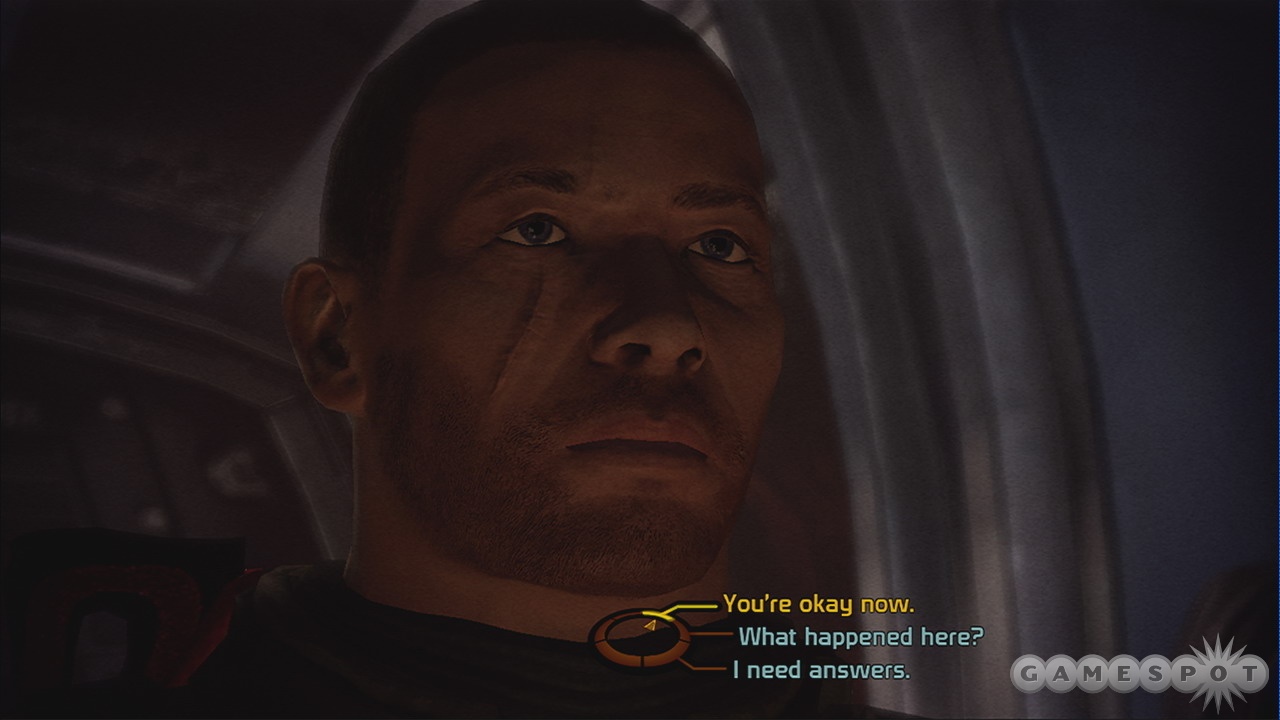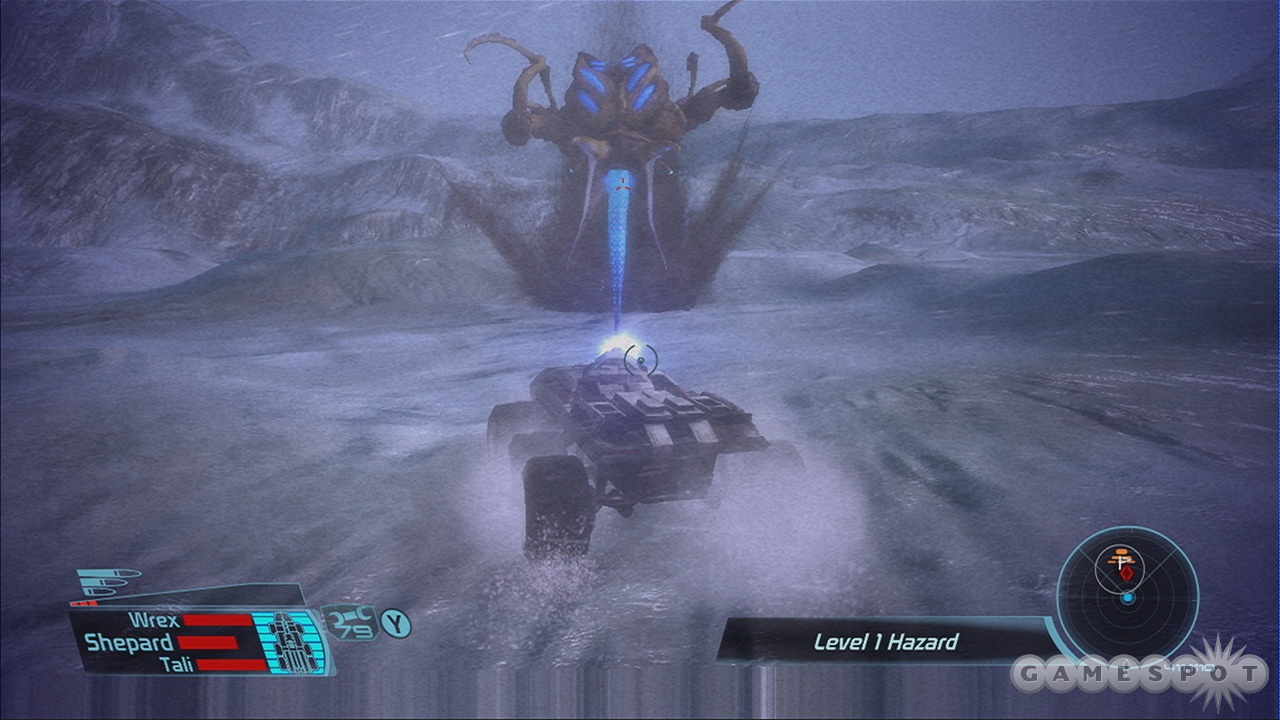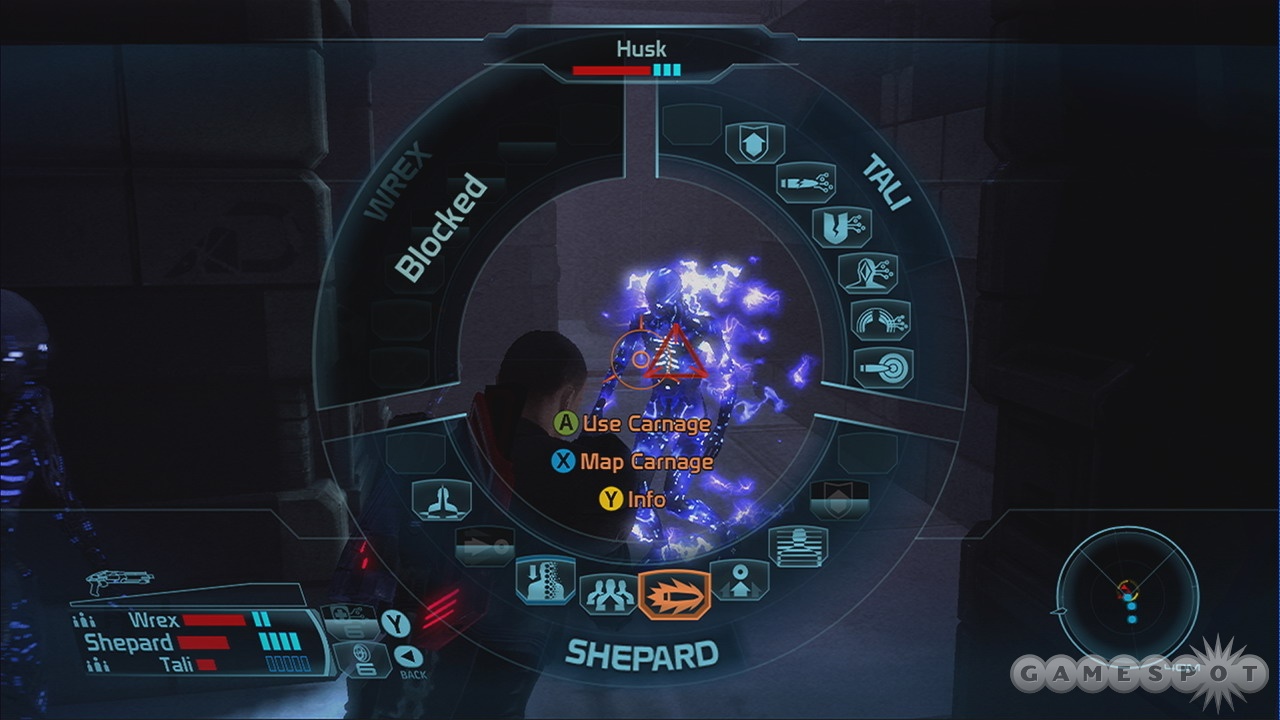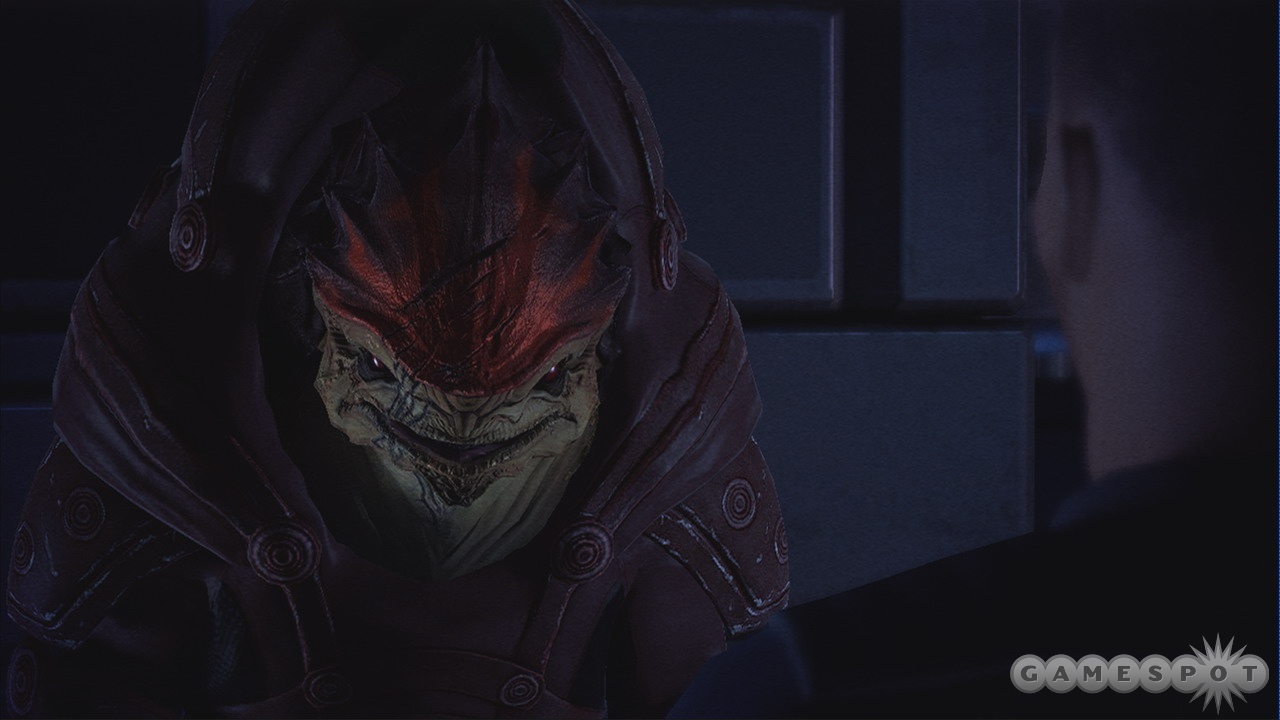Developer BioWare has always been at the forefront of progressive storytelling in games, so it's no surprise that Mass Effect's story is one of its best yet. It's got a unique take on the chase-the-bad-guy-across-the-universe plot, and just when you think you've got everything figured out, the game throws you yet another surprise. BioWare has created a politically charged universe with an exhaustive backstory and filled it with a bunch of interesting, multifaceted characters. Combined with an exciting and unique combat mechanic, it makes for a fun and absorbing experience that you'll want to see through to the end, just to see how everything turns out--even if the game isn't perfect by any means. In fact, it's surprising that so many small annoyances and glitches made their way into a game of such general high quality. Still, most players will be able to look past them and enjoy Mass Effect for what it is: A terrific role-playing game with great production values and fun, exciting action.

As in most role-playing games of this nature, you begin by customizing an avatar. You play as Commander Shepard, potential savior of the galaxy, but there's plenty of room to mold him or her as you see fit. Physical customization isn't as deep as you'll find in something like last year's Oblivion, but the system is relatively robust, letting you choose from a variety of preset features, and even letting you round everything off with a scar. Shouldn't every badass commander have one? Of course, you'll also choose a class. In this case, you've got six to choose from, each with various strengths in combat, tech, and biotics (Mass Effect's sci-fi equivalent of magic). More impressively, you will select a few autobiographical tidbits--and these choices aren't just for show. Through the course of the game, characters will refer to your past, and your resulting dialogue options will allow you to react to their comments with various degrees of humility, wistfulness, and scorn.
The narrative is pure space opera, yet there's no denying that BioWare has created a tale of surprising depth and appeal. Surprise number one: Humanity is not the political center of the universe. We don't have a seat on the galactic council, or even a representative on the Spectre squad, an elite group of special forces whose members are given wide berth to solve political and military challenges as they see fit. In the meantime, a Spectre has gone rogue, ransacking ancient artifacts and unleashing the violent, robotic Geth race on an unsuspecting galaxy. As Shepard, you pursue him across the Milky Way, visiting one alien world after another and discovering the fallen Spectre's intentions along the way. He isn't the best villain ever created: He disappears for the bulk of the game, which makes finding him feel less urgent than it should. Still, the journey to the game's exciting end is one worth taking.
In true BioWare fashion, you'll be navigating through loads of dialogue trees throughout the game, and how you respond can have life-or-death consequences--though you shouldn't take that to mean that you need to brood over every decision. Oftentimes, multiple choices have the same result, a somewhat transparent trick that makes it seem as though you have a lot more impact on the conversation than you really do. At important junctures, however, your decisions can affect how missions play out. You can turn friend to foe, console (or devastate) a suicide-attack victim, or exploit evil corporate executives for fun and profit. And it all plays out amid an intricate melodrama of political intrigue and racial prejudice, and in a galaxy populated by fascinating, complex characters. There are pages ripped from the Star Wars and Star Trek playbooks, certainly, but quirks such as the interesting speech patterns of the overly-formal Hanar alien race, or the nomadic structure of the Quarian flotilla--a galactic government that's always on the move--make Mass Effect's version of the Milky Way a unique one.
When navigating dialogue, you'll also be earning paragon or renegade points, which is the usual light-versus-dark system we've come to expect from the developer. Unlike in Knights of the Old Republic, however, your decisions here will not affect any abilities you have. However, the intricate relationship between the story and the game proper means that these decisions still affect gameplay--though that effect is usually an indirect one. More interestingly, your paragon and renegade meters are separate, rather than being at opposite sides of a single spectrum. It's a subtle but effective choice that lends itself to Mass Effect's shades-of-gray fiction, where light and dark aren't mutually exclusive.
The main quest starts you on a huge space station called the Citadel, but takes you across a small series of planets before reaching the game's exciting final moments. Not that you're stuck with the main story, since you can pick up a good number of side quests along the way. Some of them are simple and relatively self-contained, while others will send you across the galaxy to uncivilized planets and derelict spaceships. This involves bringing up your galactic map, selecting a destination system, and going planetside to kick some alien butt. There are multiple regions to choose from, and often multiple solar systems within them, but while that sounds intimidating, it's not nearly as mind-bogglingly huge as you would expect. In any given system, you can usually only land on one planet--and on each of these planets, there are usually only a few things to do before you get to your destination. More surprisingly, once you've finished the mission, there's never a reason to return. Aside from the annoying thresher maws (more on these later), there aren't any hostile indigenous creatures, so once you've dispatched your foes and scavenged for loot, it's time to move on.

When you first land on a planet, you drive around in a rover called the Mako. The thing's possibly the most resilient vehicle ever created in a game. You get dropped onto the surface from hundreds of feet in the air and drive up impossibly steep mountains without much difficulty. Too bad that the driving portions are undoubtedly the weakest of the game. The weird bouncy nature of the rover and the fact that gravity is the same on every world (even Earth's own moon) are both suspect issues, though they don't really affect gameplay.
The rocky planetary design and Mako combat mechanics can really be a downer when combined together. You can spray machine gun fire or launch shells at your foes, and it works fine, provided you are on the same level as your enemies. However, the Mako's turret, for whatever reason, can't move up or down. The result is that bullets don't necessarily land where your crosshair is, so if you're on higher terrain or your target is too close, those endless clips you're unloading are useless (though you can hit enemies above you without difficulty). It's sometimes maddening, since in many situations, the enemy base is nestled below you in a crevasse, and you're forced to either get in closer (often a death sentence in an area swarming with tough foes like the robotic Geth colossi), or get out and try to take on the toughest foes of the game on foot. Be careful if you get out of the Mako in areas like these though, since your adventuring party can slide into a deep valley and get stuck very easily, which forces you to either return to the Normandy (your ship) and return to the planet, or reload a saved game.
The other issue here is with the aforementioned thresher maws, which are sandworm-like beings that burst from the ground, spew deadly goo at you, submerge, and emerge elsewhere. These encounters can be really exciting, since the things are tough to take down and keep you on the move. The problem is that the game doesn't check on the Mako's position before respawning the thresher maw. Multiple times, we had the creature emerge from directly underneath us, which either resulted in an unavoidable insta-kill or getting stuck in the thresher's geometry while the camera jittered madly. That's just not fun, and you will find yourself avoiding flat expanses on planets just to avoid these problems.
Thankfully, on-foot combat is a lot of fun. You'll accumulate six total teammates, two of whom can accompany you on missions at any given time. They have a variety of talents, and each of them is special in his or her own way. There's a variety of guns to choose from, from pistols to shotguns to assault rifles, and each weapon can be outfitted with various upgrades that may increase stability, add scanners that bypass disrupted enemy radar, and more. You can also outfit special ammunition, though you always have unlimited ammo.
On top of that, some characters have magic-like powers called biotics to mess with. It's worth noting, however, that these powers are focused on manipulation rather than direct offense. You can push enemies back with the throw power (awesome to behold at higher levels), lift them in the air, or create a vortex that sucks enemies toward it (another great use of Mass Effect's fun combat physics). Engineers have some nice abilities as well, such as the ability to sabotage weapons from a distance, which makes your enemy's weapon explode, or the power to turn robotic enemies against your own foes. As a rule, your teammates aren't a liability, though they aren't governed by the most advanced artificial intelligence we've ever seen. But provided you micromanage them as described below, you'll not only be getting the most out of the experience, you won't be apt to notice any drawbacks to the AI.

The combat feels like it belongs in a third-person shooter at first, but if you continually approach it this way, you'll die. A lot. Like in many previous BioWare RPGs, you're meant to pause, survey the situation, and perform your actions. As long as you stick to that method, you'll find combat to be a lot easier than it first appears. You can set your party members to automate their actions, simply perform defensive powers on their own (the better choice), or only perform powers on your command. Holding the right bumper brings up the command wheel, which lets you assign orders to your companions, as well as perform your own abilities. You can also take cover behind walls or other objects, though this mechanic isn't all that helpful. Once you get into the groove, battles are rather enjoyable, with a flurry of bullets and biotic powers flying around. The joy of flinging the Geth around, filling them with shotgun shells, and watching them drop from the ceiling after lifting them in the air is a joy few RPGs can approximate.
The spoils of battle are always a fun reward for a job well done, and loot ramps up pretty well. You can also open up various lockers and containers for more loot, though it's best to level one of your party members in the decryption skill for the more difficult-to-open ones. To open locked containers, you have two equally odd choices: Either perform a minigame that resembles the overdone contextual button presses we've seen in far too many games of late, or smear omnigel on the container, which is an all-purpose goo that opens cabinets, repairs the Mako, and, we suspect, may also eliminate ring-around-the-collar. It sounds like a silly mechanic, but all things considered, it's a perfectly legitimate way of keeping the user engaged in the looting process, and it makes you feel like you earned the resulting spoils.
As you can imagine, you'll be doing a lot of fiddling with your inventory, what with all these weapons, upgrades, and party members to deal with, but this is another stumbling block that could have used some streamlining. The menu interface isn't terrible, though on its own, it's a bit clunky. But it's the little things that add up in a game that requires you to spend so much time in menu screens. First annoyance: In some menu screens, you can't hit a button simply to escape to the previous menu. For example, in the weapons upgrade menu, if you decide you don't want to make any changes, you can't just leave the menu--you have to choose something, even if it means scrolling to the top of the list and selecting the same upgrade you already had equipped. In other cases, such as when you convert an item to omnigel, the menu jumps back to the top of the list, which is vexing. You can't even deselect a power from the ability wheel in combat once you've chosen one. You can change the skill, but on the frequent occasion where you will want to change your mind after selection and not cast one at all, you're stuck wasting a skill and waiting for it to recharge.
Other problems rear their heads as well, such as the occasions when you or your party members get trapped on level geometry, which forces you to reload your last save. But you'll be apt to forgive them in light of the depth and variety to be found here. It's fun to get to know your crew, conduct a clandestine romance, or turn Shepard into a hard-line exclusionary (or a racially sensitive diplomat). You could finish a fairly complete play-through in 40 hours--standard for a role-playing game--but there's enough contextual content to make it worth a second play, if only to explore your renegade side, try out other romance options, or see another of the multiple endings. On the other hand, if you ignored the side quests and stuck with just the main storyline, you could be done in 15 hours or less.
Mass Effect's visuals are excellent. Facial animations are among the best in gaming: Characters move their lips believably with the dialogue, further expressing themselves with subtle tilts of the head or with a slight raise of the eyebrows. Character models are beautifully detailed, such as with your Krogan teammate Wrex, whose every wrinkle and ridge is carefully textured and molded. There are some technical hitches, however. The framerate can dramatically dip at the worst possible times, and there is a lot of texture pop-in. There are also frequent load times--some of them hidden by elevator rides, others popping up in the midst of exploration. Nevertheless, Mass Effect looks wonderful. From an artistic perspective, the game looks great, if not quite original. Planet outposts tend to use only one of two interior layouts, and environments owe a lot to games and films of the past (much of the game's look wouldn't be out of place in a Halo title). But even with the obvious inspirations, Mass Effect still conveys its vision clearly, thanks to meticulous character designs and dramatic set pieces, such as the Citadel itself.

It's also one of the best-acted games in recent memory. An all-star cast including such well-known actors as Fred Tatasciore and Seth Green bring Mass Effect's characters to brilliant life. Not once will a drab line delivery or overzealous histrionics get in the way of your immersion. The soundtrack is evocative, with just the right amount of sci-fi shimmering to round out the occasional symphonic swelling. Sound effects are great across the board, from the robotic yammering of the Geth to the din of a planetary blizzard filling the room with its high-powered whooshing.
All told, Mass Effect is a great game with moments of brilliance and a number of small but significant obstacles that hold it back from reaching its true potential. But in the end, if you like RPGs and want to spend some time in an absorbing sci-world populated with a bunch of unique inhabitants, you'll definitely have plenty of fun with this one.